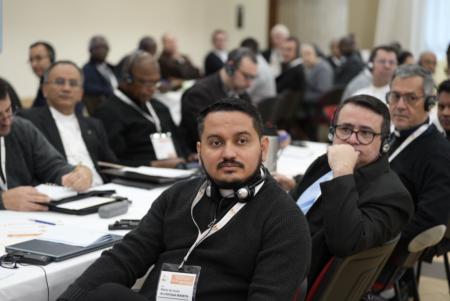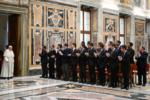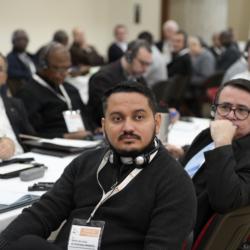Sludge removal
In February I took a retreat. It was time for a tune-up. My soul-o-meter was in the red, way over its 4,000 prayer limit. I needed new oil, some quiet breaks, and an overhaul of that vital instrument of the apostolic journey, the catalytic converter, otherwise known as the human heart. So I scheduled a sludge removal of the religious kind.
After all the diagnostic tests and adjustments--sitting here for a time in front of Jesus in the Blessed Sacrament, resting there for a time with a book about Jesus in the Gospels, and listening quietly at other times to the reflections of a wise priestly mechanic--my “check engine” light went off and the motor restarted.
Pope Benedict XVI has urged us to renew our love for Jesus and to rediscover God’s love for us. A retreat, especially before or during Lent, gives one the opportunity to revive that most fundamental Christian relationship, our friendship with Christ. Manual, not automatic, is the only transmission available, requiring the work of our feet and hands to shift into gear and needing our constant attention.
As it is with us in renewing our spiritual inspection stickers, so it should be with society and politics. This is the time of year, the first of our state and federal governments’ two-year cycle, when freshly elected or re-elected officials file their bills and choose their leadership. Wouldn’t it be something if these people too, along with their staffs, took a retreat and reflected on the law’s relationship with truth?
At the state level, while drawing one’s index finger down the pages of the Senate and House dockets, where all of the newly filed bills are listed, one discovers a bewildering array of topics and goals. Almost six thousand bill entries fill the state docket lists. Money, morals and (some say) madness mark just some of the areas of proposed lawmaking.
For example, one bill addresses the fundamental question of life and death, proposing to legalize doctor-assisted suicide; another bill promises to remedy a town’s problem with swine in the streets. Some bills seek to add to or take away from our current statute books just one word; other bills rival in length the novel ‘‘War and Peace,’’ truly matching the complexity of Tolstoy’s work, although lacking its drama.
As rings in the trunk of a maple or oak thicken or narrow according to weather patterns during the lifetime of the tree, the bill docket lists reflect from term to term the waxing and waning of economic and social patterns. This year, of course, the financial crisis has spurred the filing of many bills, especially at the federal level, dealing with mortgages, foreclosures and bailouts. Other issues, such as same-sex marriage and embryonic stem cell research, have waned at the state level if only because bills dealing with these issues were either passed or killed in earlier sessions.
Nonetheless, some bills that failed before have been refiled at the State House in Boston. Legislation addressing informed consent before an abortion, parental consent requirements and curriculum mandates for sexuality lessons in the public schools, transgender rights, and gambling will again be heard. As already mentioned, a right-to-die bill has also been submitted, bringing the assisted suicide issue back to life for the first time in the Commonwealth since the late nineteen nineties.
At the federal level, not all the anticipated bills have been filed yet in Congress. Thus, at the time of this writing, no congressional member has submitted the Freedom of Choice Act. Nonetheless, that bill, enshrining abortion rights as a federal statutory guarantee, along with other legislation proposing to use taxpayer funds for abortions and eliminating embryonic stem cell research limits, are expected to appear in Congress this term.
Often I find myself telling people, especially in places other than Massachusetts, that the Roman Catholic Church and its allies in the Commonwealth labor in “mission territory.” Boston is the “deep North” equivalent of capitals in the “deep South.” Just as the anti-slavery movement did not exactly thrive in Richmond or Raleigh before and during the Civil War, stiffly opposed here and now in the modern-day culture wars of Massachusetts are those who seek to defend human life in the womb or who believe that marriage should be defined as the union of man and woman.
It took a mighty and prolonged struggle to erase laws endorsing slavery from our nation’s statute books. These laws were defended by powerful interests and did not fall quickly or easily. But those who opposed such laws persisted and, against tremendously unfavorable odds, eventually prevailed.
In the face of present-day attacks on the social justice and moral teachings of the Church, retreat is not an option. However, attending a retreat now and then to replenish one’s energy and resolve is a necessity.
Daniel Avila is the Associate Director for Policy and Research of the Massachusetts Catholic Conference.



















